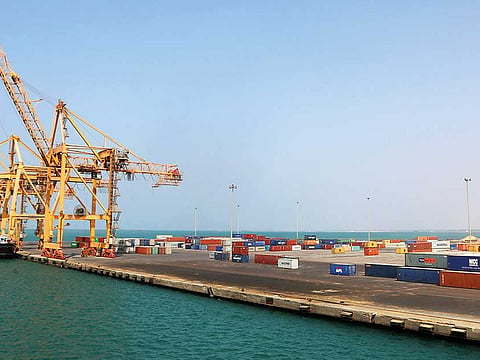Coalition set for decisive action on Hodeida
Aim of looming offensive is to cut off Al Houthis’ major source of cash and stop the flow of sophisticated Iranian arms

Al Mukalla: The Saudi-led coalition will soon launch an offensive on the Al Houthi-controlled Red Sea port city of Hodeida, a Yemeni political expert tells Gulf News.
The decision comes after a ballistic missile launched by Al Houthis was intercepted over the Saudi capital on Saturday which Riyadh declared as ‘an act of war’.
Saudi foreign minister Adel Al Jubeir in an interview with CNN said that the missile was Iranian-made and came through Hodeida in pieces where it was assembled by Al Houthi militants with the help of Iranian Revolutionary Guards and Lebanese Hezbollah militants.
Saudi Arabia has long complained of Iran’s weapons smuggling into Yemen and on Wednesday, the United States also made the same accusation. A White House statement condemned Iran’s actions and voiced US support to Saudi Arabia and other Gulf partners against Tehran’s “blatant” violations of international law.
Reports in recent months have also shown that the weapons coming in are increasingly sophisticated with longer-range capabilities and cutting-edge technologies.
Because of this, Riyadh will take decisive action against Iran’s smuggling of arms to their Al Houthi proxies in Yemen, Yasser Al Yafae, a political analyst based in Yemen’s southern port of Aden told Gulf News.
“The new developments indicate that the Saudi-led coalition plans to mount massive strikes on the city from air and sea,” he said.
The coalition has delayed an impending offensive on Hodeida several times because of pressure from the international community to spare the vital sea port from destruction.
It also accepted a proposal by the UN envoy to Yemen that would hand over control of the sea port to a neutral third party—however Al Houthis rejected the proposal.
The Yemeni government blames Al Houthis for the deadlock and diplomatic efforts to resolve the Hodeida issue have largely failed.
UN humanitarian bodies have already began evacuating staff and asked aid ships to immediately leave the city’s seaport.
Al Masdar Online, an independent news site, reported that eight commercial ships out of 23 ships docking the seaport left the port, heading towards international waters.
Government forces that are battling Al Houthis in Yakhtul, almost 170km south of Hodeida would be involved in the battle, military experts tell Gulf News.
The coalition’s navy and fighter jets are expected to launch heavy air strikes to pave the way for ground forces to advance.
Unlike other fronts where Al Houthi militants take shelter along rugged mountains, in Hodeida province, government forces would battle the militis on open terrain.
TAl Houthis have steadily lost territories it captured along the Red Sea to government forces backed by logistical and air support from the coalition.
Within several months, government forces seized control of major posts near the strategic Bab Al Mandab Strait, including Mokha town.
Government forces also gained control of Medi seaport, another infamous entry point for arms.
But despite the fact that liberated areas have been secured, arms have still been able to reach the militants.
Speaking to Gulf News, a number of army commanders said that the rebels are now using modern anti-tank arms and sniper rifles that have existed in Yemen army’s arsenal.
Hodeida is Yemen’s most important commercial hub because of its proximity to heavily-populated provinces in northern Yemen.
Around 80 per cent of fuel and other goods come through Hodeida, despite the raging war in south and north of the city, a recent study showed.
The Abbad Centre for Strategic Studies says a military operation on the city would cut the militants’ access to its key source of revenue as well as weapons.
The militias earn millions of dollars annually from taxing the goods that flow through the port.
Al Houthis captured Hodeida in late 2014 shortly after their coup against the internationally-recognised government of Abd Rabbo Mansour Al Hadi.
Since seizing the seaport, the Iranians and Al Houthis have used the country’s archipelago in the Red Sea for storing arms that come from Iran through the Horn of Africa.
After that, rebels transport the arms in small fishing boats to Yemen’s shore, the Abbad study said, adding that the arms enabled the power balance to shift in favour of Al Houthis during their explosive military expansion.
Since then, the Saudi-led coalition has taken control of most of the islands and is now moving to purge Al Houthis from the remaining smuggling points.
The study pointed out that Al Houthis depended on veteran smugglers with deep ties to ousted Yemeni president Abd Rabbo Mansour Hadi in the past.
Saleh entered an awkward alliance with Al Houthi militants against Hadi which has for the most part held together despite recent cracks in the relationship.
In September last year Reuters reported that Brazil’s Forjas Taurus SA, a giant arms manufacturer in Latin America, shipped thousands of handguns to Fares Mana’a, a notorious Yemeni trafficker who was a close friend of Saleh.
Mana’a switched sides and backed Al Houthi rebels and is believed to be using his craft to bring in arms to Al Houthis.



